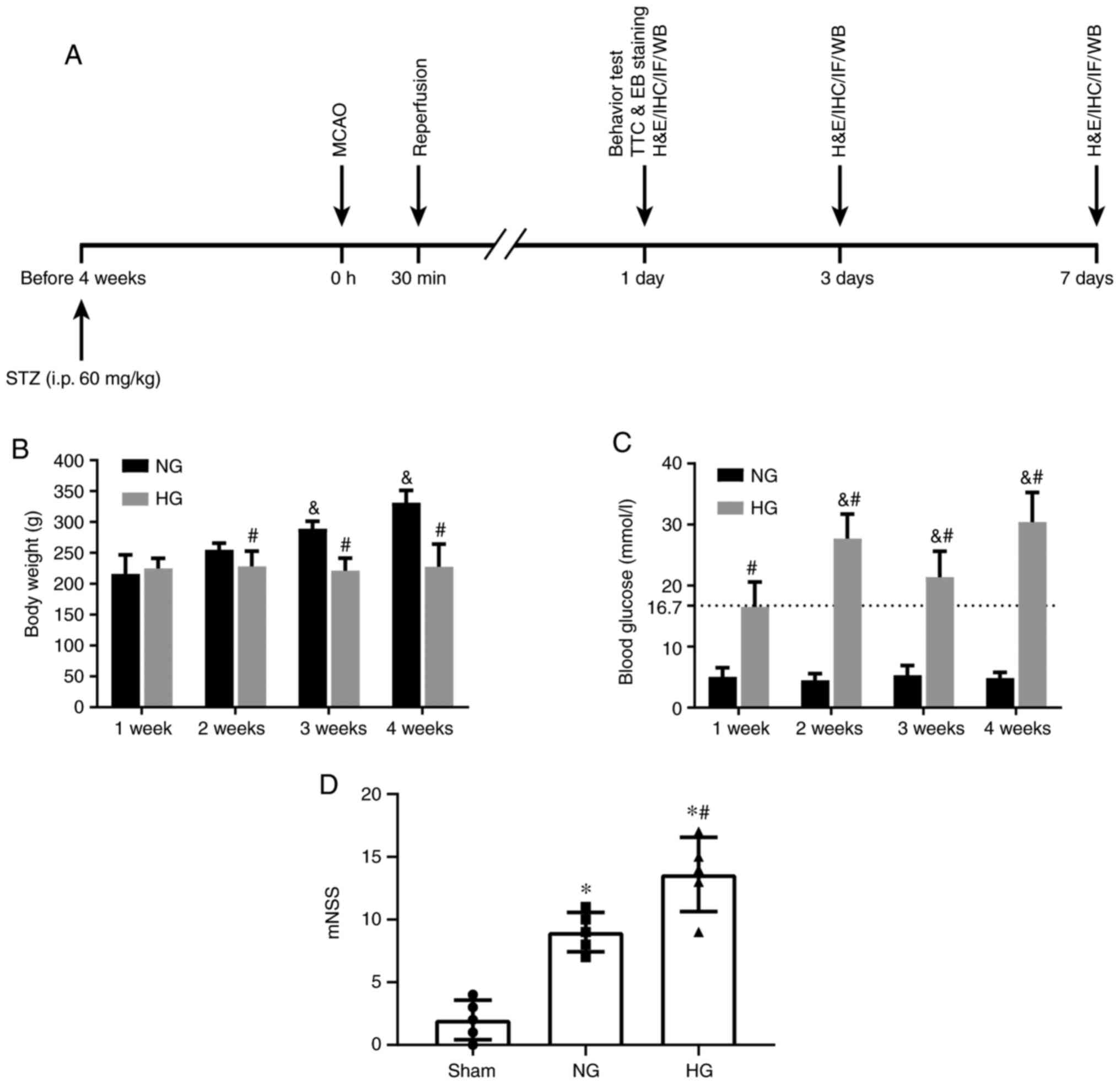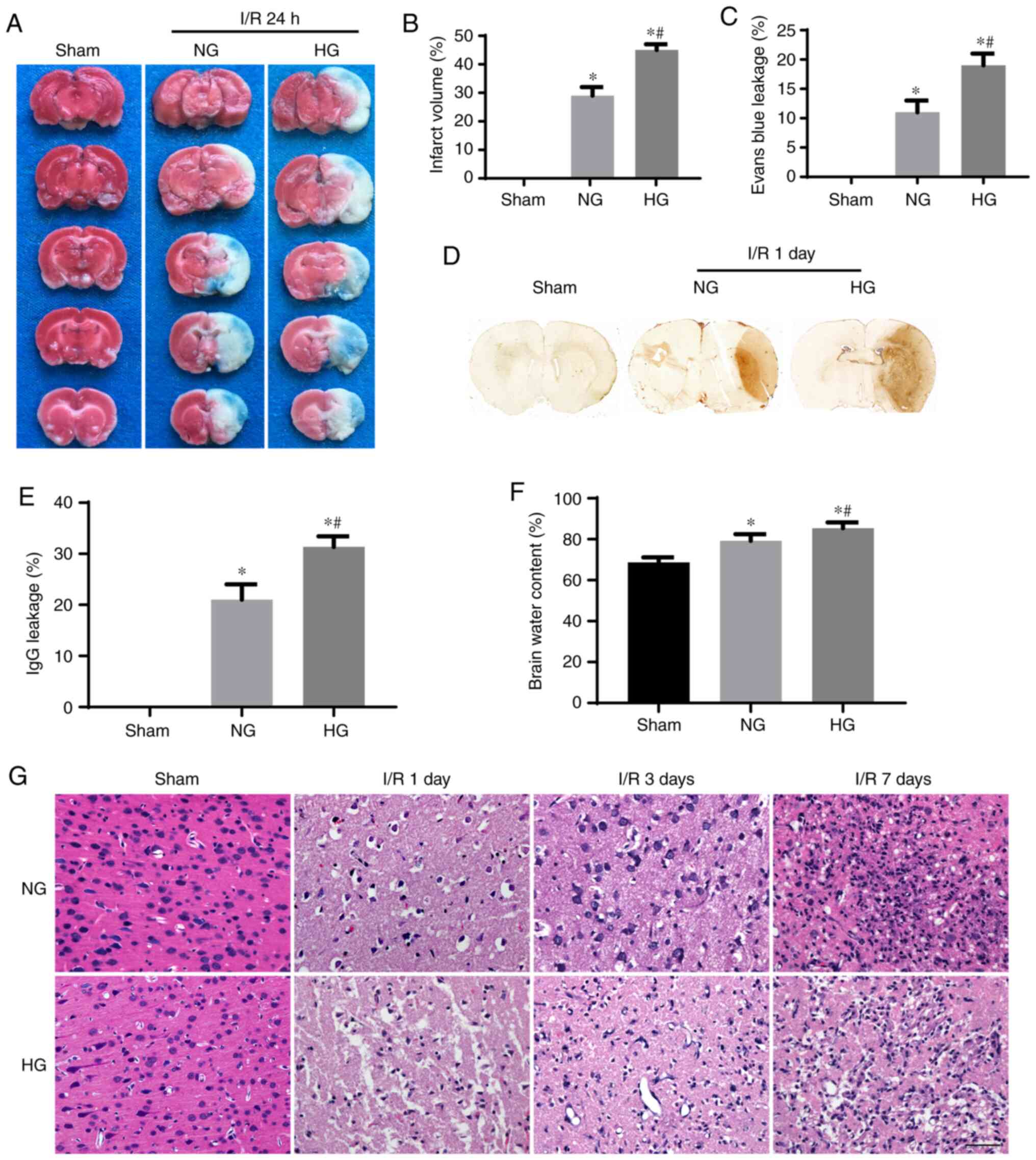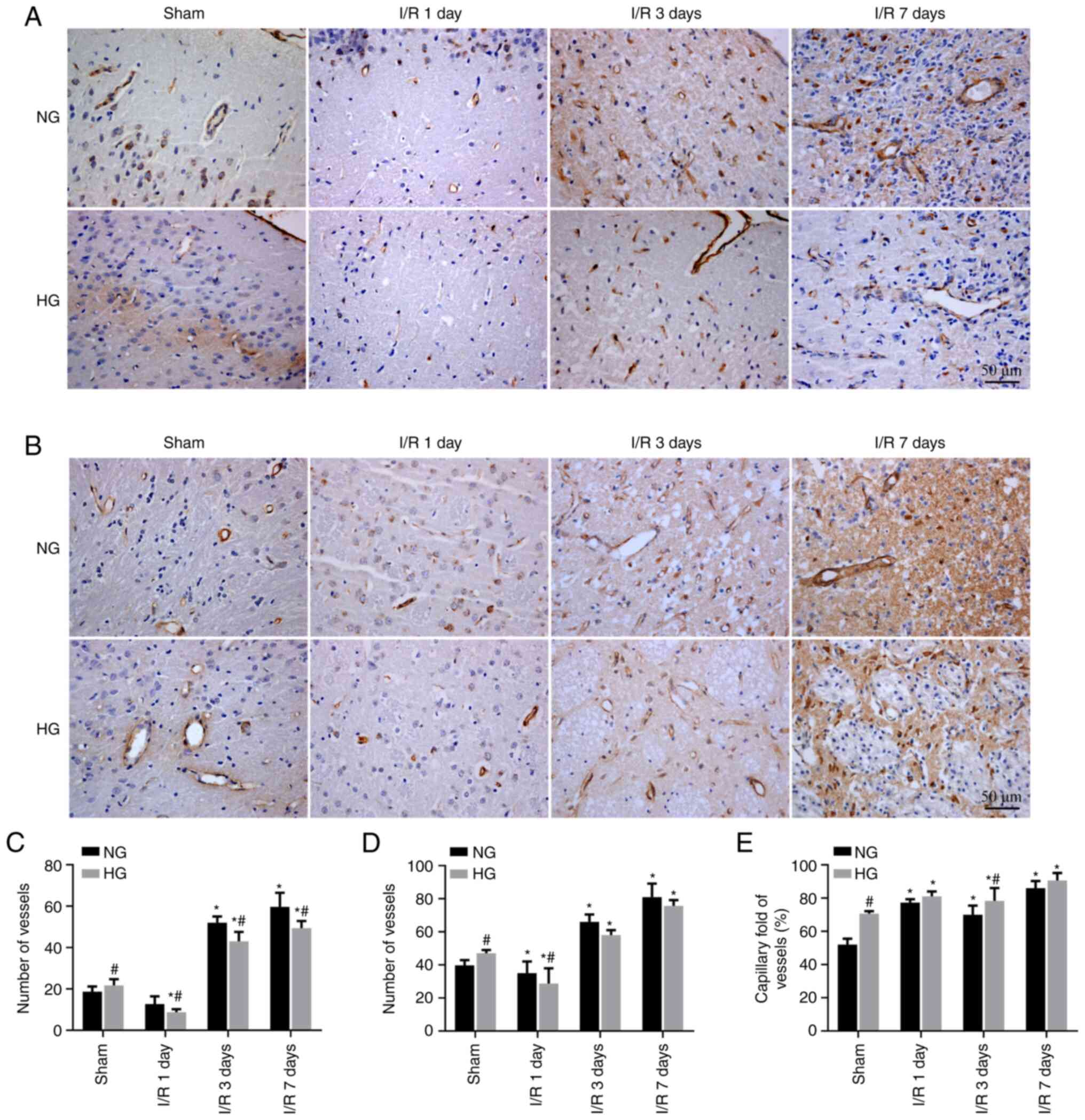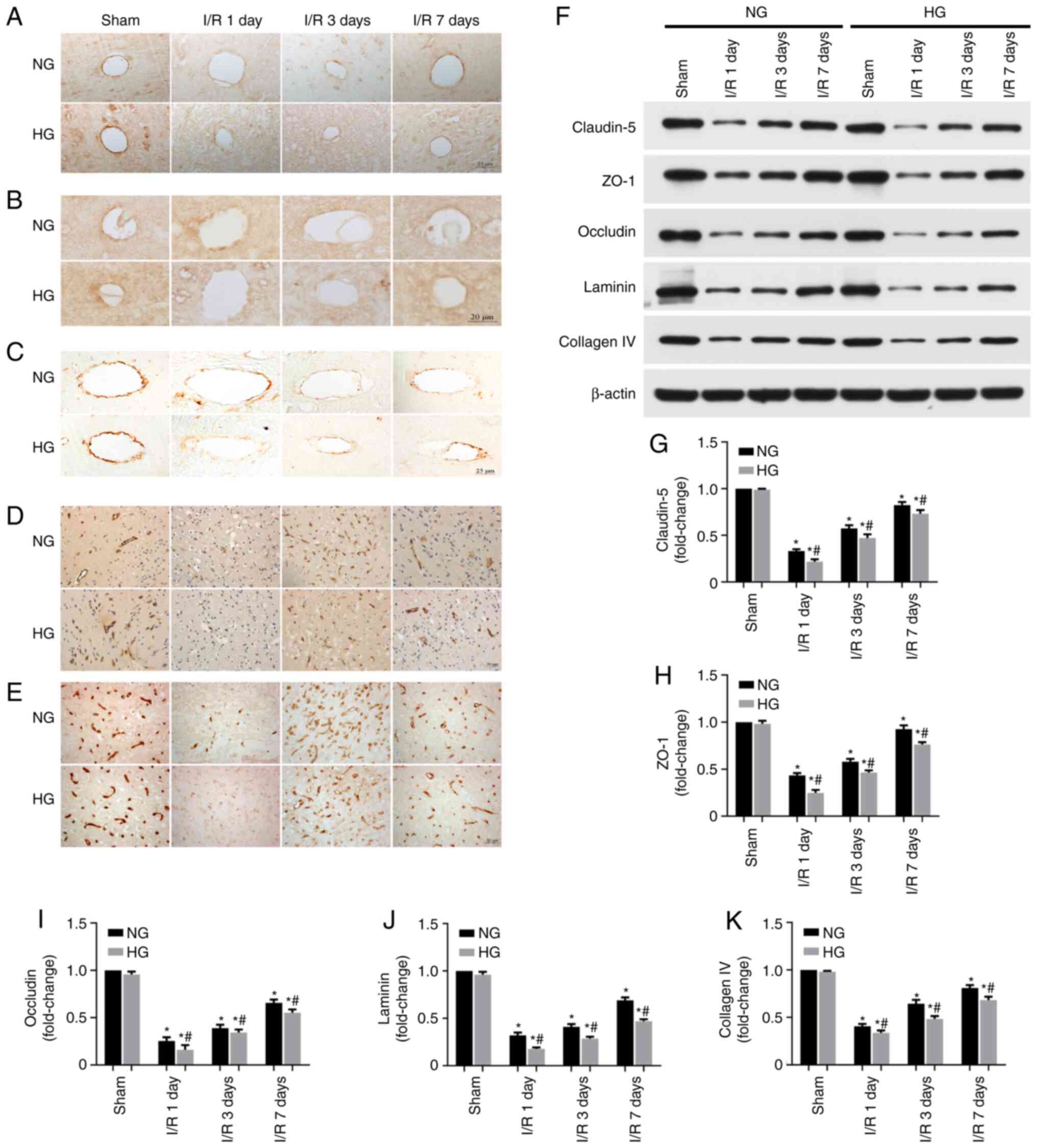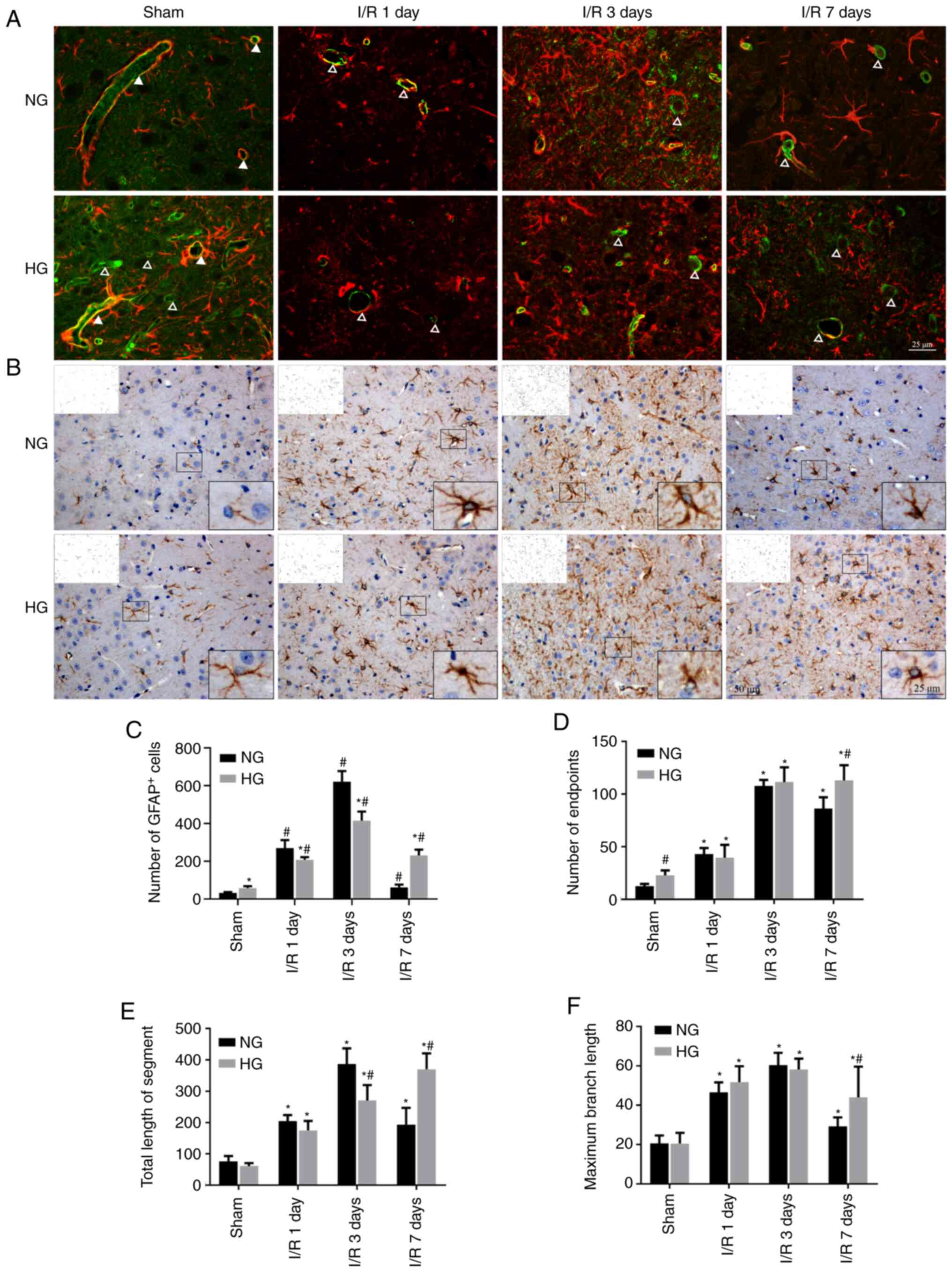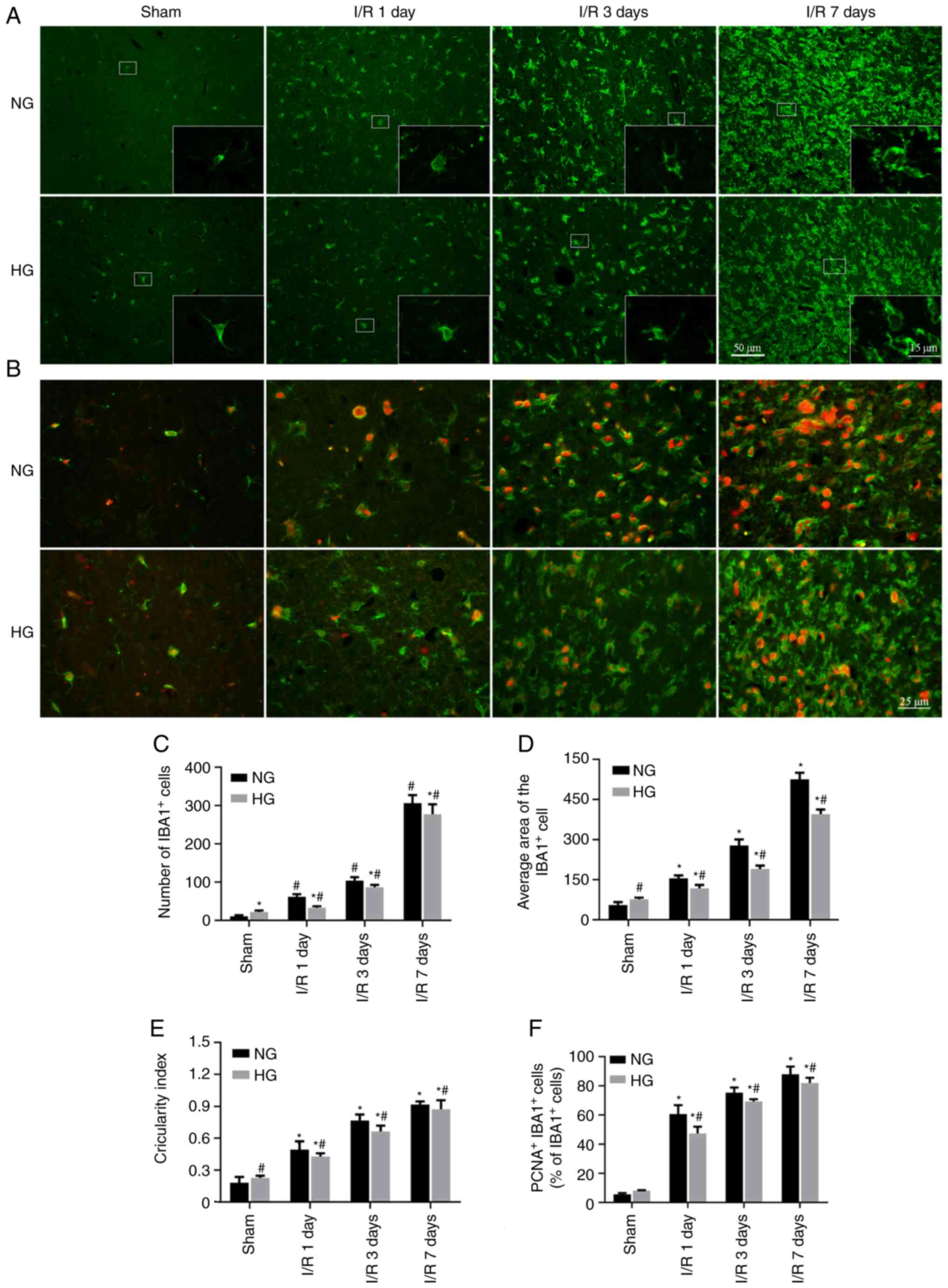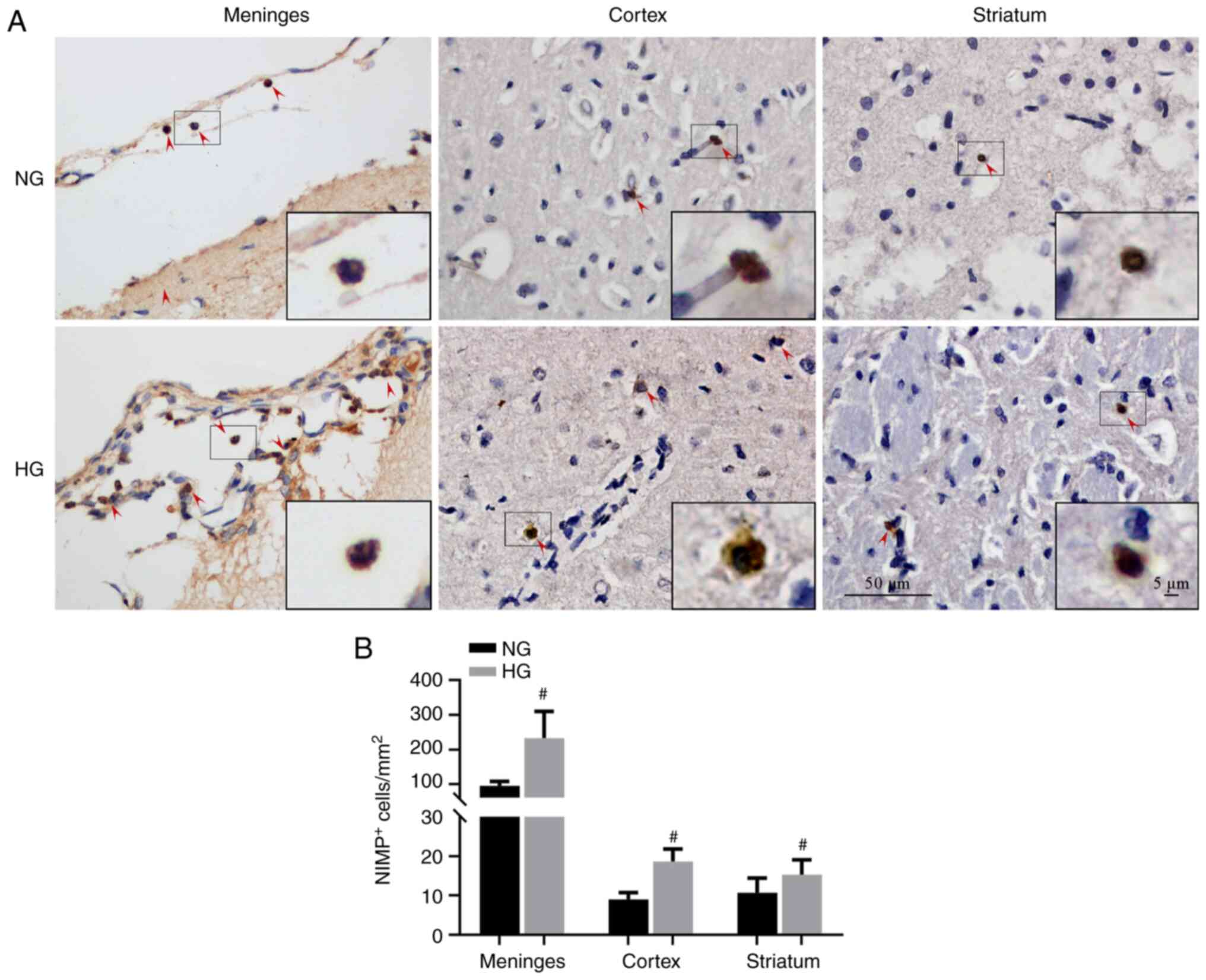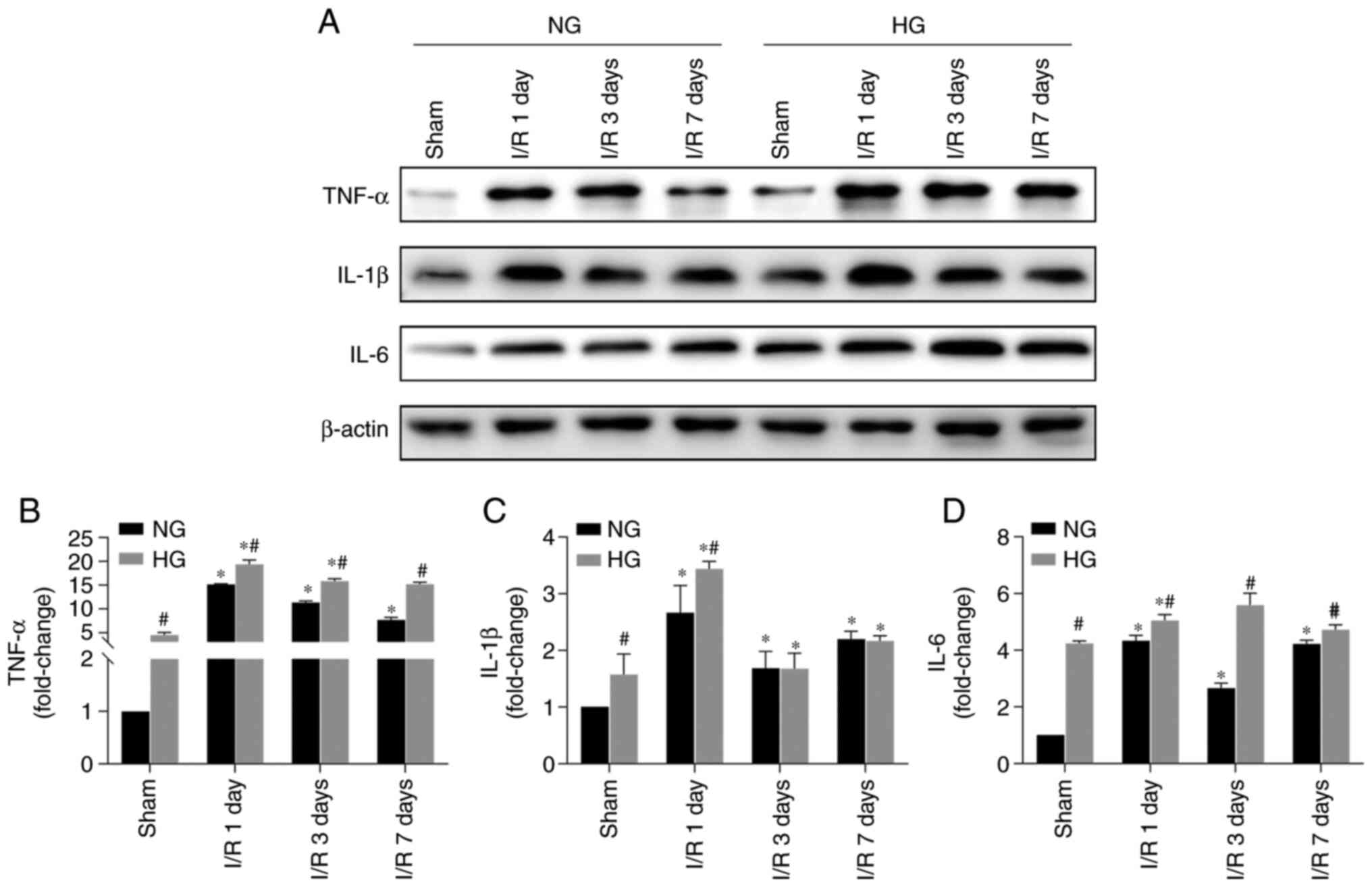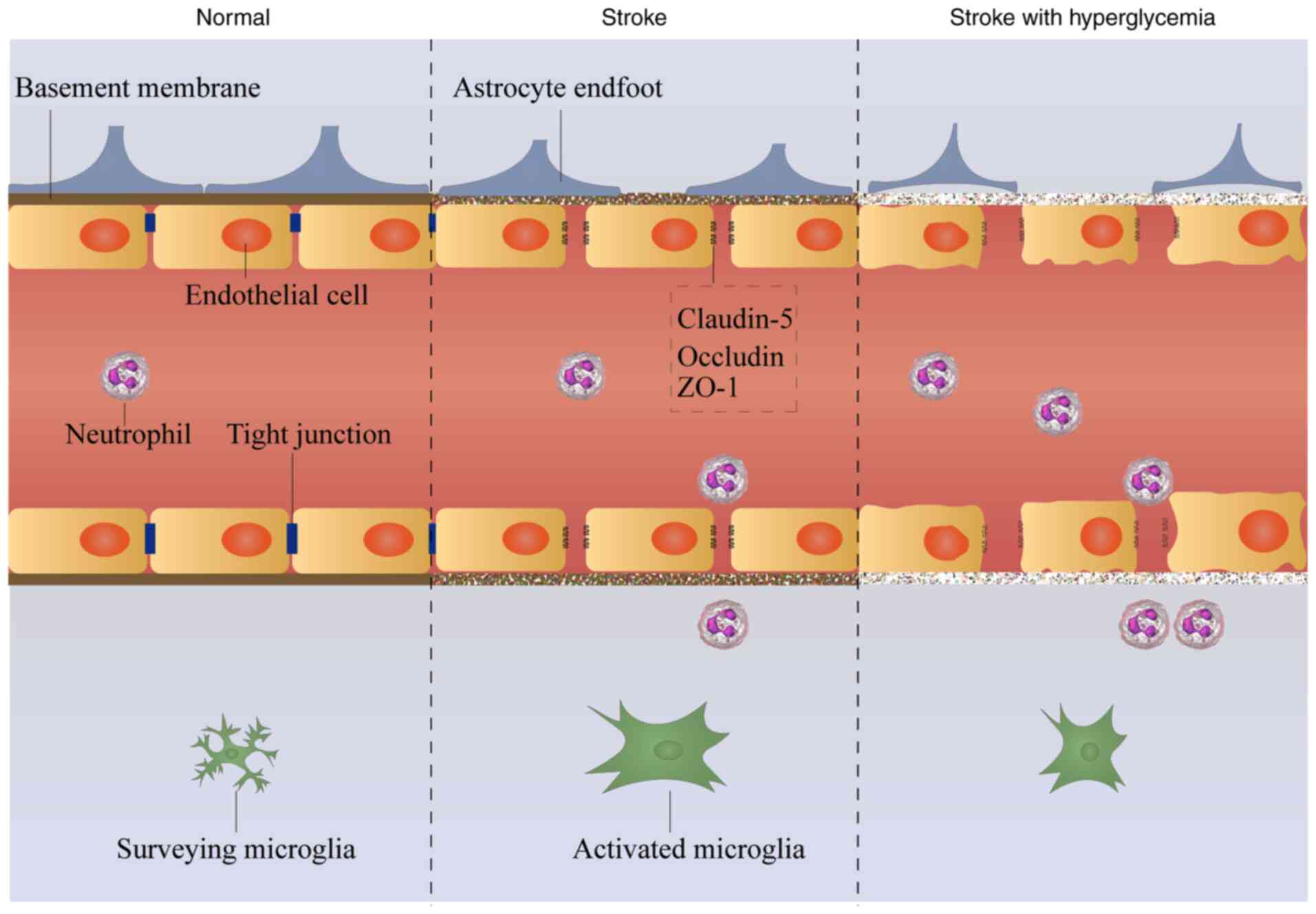|
1
|
Li W, Prakash R, Kelly-Cobbs AI, Ogbi S,
Kozak A, El-Remessy AB, Schreihofer DA, Fagan SC and Ergul A:
Adaptive cerebral neovascularization in a model of type 2 diabetes:
Relevance to focal cerebral ischemia. Diabetes. 59:228–235. 2010.
View Article : Google Scholar
|
|
2
|
Chen R, Ovbiagele B and Feng W: Diabetes
and stroke: Epidemiology, pathophysiology, pharmaceuticals and
outcomes. Am J Med Sci. 351:380–386. 2016. View Article : Google Scholar : PubMed/NCBI
|
|
3
|
Li W, Qu Z, Prakash R, Chung C, Ma H, Hoda
MN, Fagan SC and Ergul A: Comparative analysis of the neurovascular
injury and functional outcomes in experimental stroke models in
diabetic Goto-Kakizaki rats. Brain Res. 1541:106–114. 2013.
View Article : Google Scholar : PubMed/NCBI
|
|
4
|
Hu Q, Manaenko A, Bian H, Guo Z, Huang JL,
Guo ZN, Yang P, Tang J and Zhang JH: Hyperbaric oxygen reduces
infarction volume and hemorrhagic transformation through
ATP/NAD+/Sirt1 pathway in hyperglycemic middle cerebral
artery occlusion rats. Stroke. 48:1655–1664. 2017. View Article : Google Scholar : PubMed/NCBI
|
|
5
|
Lanier WL, Hofer RE and Gallagher WJ:
Metabolism of glucose, glycogen, and high-energy phosphates during
transient forebrain ischemia in diabetic rats: Effect of insulin
treatment. Anesthesiology. 84:917–925. 1996. View Article : Google Scholar : PubMed/NCBI
|
|
6
|
Muranyi M, Fujioka M, He Q, Han A, Yong G,
Csiszar K and Li PA: Diabetes activates cell death pathway after
transient focal cerebral ischemia. Diabetes. 52:481–486. 2003.
View Article : Google Scholar : PubMed/NCBI
|
|
7
|
Liu WJ, Jiang HF, Rehman FU, Zhang JW,
Chang Y, Jing L and Zhang JZ: Lycium barbarum polysaccharides
decrease hyperglycemia-aggravated ischemic brain injury through
maintaining mitochondrial fission and fusion balance. Int J Biol
Sci. 13:901–910. 2017. View Article : Google Scholar : PubMed/NCBI
|
|
8
|
Lu CJ, Guo YZ, Zhang Y, Yang L, Chang Y,
Zhang JW, Jing L and Zhang JZ: Coenzyme Q10 ameliorates cerebral
ischemia reperfusion injury in hyperglycemic rats. Pathol Res
Pract. 213:1191–1199. 2017. View Article : Google Scholar : PubMed/NCBI
|
|
9
|
Yang L, Ma YM, Shen XL, Fan YC, Zhang JZ,
Li PA and Jing L: The involvement of mitochondrial biogenesis in
selenium reduced Hyperglycemia-Aggravated cerebral ischemia injury.
Neurochem Res. 45:1888–1901. 2020. View Article : Google Scholar : PubMed/NCBI
|
|
10
|
Lo EH, Dalkara T and Moskowitz MA:
Mechanisms, challenges and opportunities in stroke. Nat Rev
Neurosci. 4:399–415. 2003. View
Article : Google Scholar : PubMed/NCBI
|
|
11
|
Zhao Z, Nelson AR, Betsholtz C and
Zlokovic BV: Establishment and dysfunction of the Blood-Brain
barrier. Cell. 163:1064–1078. 2015. View Article : Google Scholar : PubMed/NCBI
|
|
12
|
Engelhardt B and Liebner S: Novel insights
into the development and maintenance of the blood-brain barrier.
Cell Tissue Res. 355:687–699. 2014. View Article : Google Scholar : PubMed/NCBI
|
|
13
|
Abdullahi W, Tripathi D and Ronaldson PT:
Blood-brain barrier dysfunction in ischemic stroke: Targeting tight
junctions and transporters for vascular protection. Am J Physiol
Cell Physiol. 315:C343–C356. 2018. View Article : Google Scholar : PubMed/NCBI
|
|
14
|
Fang B, Zhang Y and Ma H: Effects of
MIR-122a on blood-spinal cord barrier after spinal cord
ischemia-reperfusion injury in rats. Chin Pharmacol Bull.
33:703–706. 2017.In Chinese.
|
|
15
|
Lv J, Hu W, Yang Z, Li T, Jiang S, Ma Z,
Chen F and Yang Y: Focusing on claudin-5: A promising candidate in
the regulation of BBB to treat ischemic stroke. Prog Neurobiol.
161:79–96. 2018. View Article : Google Scholar
|
|
16
|
Miyamori H, Takino T, Kobayashi Y, Tokai
H, Itoh Y, Seiki M and Sato H: Claudin promotes activation of
pro-matrix metalloproteinase-2 mediated by membrane-type matrix
metalloproteinases. J Biol Chem. 276:28204–28211. 2001. View Article : Google Scholar : PubMed/NCBI
|
|
17
|
Zhang GS, Tian Y, Huang JY, Tao RR, Liao
MH, Lu YM, Ye WF, Wang R, Fukunaga K, Lou YJ and Han F: The
γ-secretase blocker DAPT reduces the permeability of the
blood-brain barrier by decreasing the ubiquitination and
degradation of occludin during permanent brain ischemia. CNS
Neurosci Ther. 19:53–60. 2013. View Article : Google Scholar
|
|
18
|
Fanning AS, Jameson BJ, Jesaitis LA and
Anderson JM: The tight junction protein ZO-1 establishes a link
between the transmembrane protein occludin and the actin
cytoskeleton. J Biol Chem. 273:29745–29753. 1998. View Article : Google Scholar : PubMed/NCBI
|
|
19
|
Sandoval KE and Witt KA: Blood-brain
barrier tight junction permeability and ischemic stroke. Neurobiol
Dis. 32:200–219. 2008. View Article : Google Scholar : PubMed/NCBI
|
|
20
|
Paulsson M: Basement membrane proteins:
Structure, assembly, and cellular interactions. Crit Rev Biochem
Mol Biol. 27:93–127. 1992. View Article : Google Scholar : PubMed/NCBI
|
|
21
|
Yurchenco PD, Amenta PS and Patton BL:
Basement membrane assembly, stability and activities observed
through a developmental lens. Matrix Biol. 22:521–538. 2004.
View Article : Google Scholar : PubMed/NCBI
|
|
22
|
Martin GR and Timpl R: Laminin and other
basement membrane components. Annu Rev Cell Biol. 3:57–85. 1987.
View Article : Google Scholar : PubMed/NCBI
|
|
23
|
Hallmann R, Horn N, Selg M, Wendler O,
Pausch F and Sorokin LM: Expression and function of laminins in the
embryonic and mature vasculature. Physiol Rev. 85:979–1000. 2005.
View Article : Google Scholar : PubMed/NCBI
|
|
24
|
Di Russo J, Hannocks MJ, Luik AL, Song J,
Zhang X, Yousif L, Aspite G, Hallmann R and Sorokin L: Vascular
laminins in physiology and pathology. Matrix Biol. 57-58:140–148.
2017. View Article : Google Scholar
|
|
25
|
Hamann GF, Burggraf D, Martens HK,
Liebetrau M, Jäger G, Wunderlich N, DeGeorgia M and Krieger DW:
Mild to moderate hypothermia prevents microvascular basal lamina
antigen loss in experimental focal cerebral ischemia. Stroke.
35:764–769. 2004. View Article : Google Scholar : PubMed/NCBI
|
|
26
|
Yepes M, Sandkvist M, Wong MK, Coleman TA,
Smith E, Cohan SL and Lawrence DA: Neuroserpin reduces cerebral
infarct volume and protects neurons from ischemia-induced
apoptosis. Blood. 96:569–576. 2000. View Article : Google Scholar : PubMed/NCBI
|
|
27
|
Abbott NJ, Rönnbäck L and Hansson E:
Astrocyte-endothelial interactions at the blood-brain barrier. Nat
Rev Neurosci. 7:41–53. 2006. View Article : Google Scholar
|
|
28
|
Sofroniew MV and Vinters HV: Astrocytes:
Biology and pathology. Acta Neuropathol. 119:7–35. 2010. View Article : Google Scholar
|
|
29
|
Dodson RF, Chu LW, Welch KM and Achar VS:
Acute tissue response to cerebral ischemia in the gerbil. An
ultrastructural study. J Neurol Sci. 33:161–170. 1977. View Article : Google Scholar : PubMed/NCBI
|
|
30
|
Kamada H, Yu F, Nito C and Chan PH:
Influence of hyperglycemia on oxidative stress and matrix
metalloproteinase-9 activation after focal cerebral
ischemia/reperfusion in rats: Relation to blood-brain barrier
dysfunction. Stroke. 38:1044–1049. 2007. View Article : Google Scholar : PubMed/NCBI
|
|
31
|
Zhang S, Shao SY, Song XY, Xia CY, Yang
YN, Zhang PC and Chen NH: Protective effects of Forsythia suspense
extract with antioxidant and anti-inflammatory properties in a
model of rotenone induced neurotoxicity. Neurotoxicology. 52:72–83.
2016. View Article : Google Scholar
|
|
32
|
Zhang S, An Q, Wang T, Gao S and Zhou G:
Autophagy- and MMP-2/9-mediated reduction and redistribution of
ZO-1 contribute to Hyperglycemia-increased Blood-Brain barrier
permeability during early reperfusion in stroke. Neuroscience.
377:126–137. 2018. View Article : Google Scholar : PubMed/NCBI
|
|
33
|
Jiang X, Andjelkovic AV, Zhu L, Yang T,
Bennett MVL, Chen J, Keep RF and Shi Y: Blood-brain barrier
dysfunction and recovery after ischemic stroke. Prog Neurobiol.
163-164:144–171. 2018. View Article : Google Scholar :
|
|
34
|
Gelderblom M, Leypoldt F, Steinbach K,
Behrens D, Choe CU, Siler DA, Arumugam TV, Orthey E, Gerloff C,
Tolosa E and Magnus T: Temporal and spatial dynamics of cerebral
immune cell accumulation in stroke. Stroke. 40:1849–1857. 2009.
View Article : Google Scholar : PubMed/NCBI
|
|
35
|
Jickling GC, Liu D, Ander BP, Stamova B,
Zhan X and Sharp FR: Targeting neutrophils in ischemic stroke:
Translational insights from experimental studies. J Cereb Blood
Flow Metab. 35:888–901. 2015. View Article : Google Scholar : PubMed/NCBI
|
|
36
|
da Fonseca AC, Matias D, Garcia C, Amaral
R, Geraldo LH, Freitas C and Lima FR: The impact of microglial
activation on blood-brain barrier in brain diseases. Front Cell
Neurosci. 8:3622014. View Article : Google Scholar : PubMed/NCBI
|
|
37
|
Hu X, De Silva TM, Chen J and Faraci FM:
Cerebral vascular disease and neurovascular injury in ischemic
stroke. Circ Res. 120:449–471. 2017. View Article : Google Scholar : PubMed/NCBI
|
|
38
|
Fan Q, Chen M, Zuo L, Shang X, Huang MZ,
Ciccarelli M, Raake P, Brinks H, Chuprun KJ, Dorn GW II, et al:
Myocardial ablation of G Protein-Coupled Receptor Kinase 2 (GRK2)
decreases Ischemia/Reperfusion injury through an Anti-Intrinsic
apoptotic pathway. PLoS One. 8:e662342013. View Article : Google Scholar : PubMed/NCBI
|
|
39
|
Morrison HW and Filosa JA: A quantitative
spatiotemporal analysis of microglia morphology during ischemic
stroke and reperfusion. J Neuroinflammation. 10:42013. View Article : Google Scholar : PubMed/NCBI
|
|
40
|
Thorsten W and Hans-Gerd L: IJBlob: An
ImageJ Library for Connected Component Analysis and Shape Analysis.
J Open Res Softw. 1:e62013. View Article : Google Scholar
|
|
41
|
Otxoa-de-Amezaga A, Miro-Mur F, Pedragosa
J, Gallizioli M, Justicia C, Gaja-Capdevila N, Ruíz-Jaen F,
Salas-Perdomo A, Bosch A, Calvo M, et al: Microglial cell loss
after ischemic stroke favors brain neutrophil accumulation. Acta
Neuropathol. 137:321–341. 2019. View Article : Google Scholar :
|
|
42
|
Tyson GW, Teasdale GM, Graham DI and
McCulloch J: Focal cerebral ischemia in the rat: Topography of
hemodynamic and histopathological changes. Ann Neurol. 15:559–567.
1984. View Article : Google Scholar : PubMed/NCBI
|
|
43
|
Sweeney MD, Zhao Z, Montagne A, Nelson AR
and Zlokovic BV: Blood-Brain barrier: From physiology to disease
and back. Physiol Rev. 99. pp. 21–78. 2019, View Article : Google Scholar
|
|
44
|
Kang M and Yao Y: Basement membrane
changes in ischemic stroke. Stroke. 51:1344–1352. 2020. View Article : Google Scholar : PubMed/NCBI
|
|
45
|
Kacem K, Lacombe P, Seylaz J and Bonvento
G: Structural organization of the perivascular astrocyte endfeet
and their relationship with the endothelial glucose transporter: A
confocal microscopy study. Glia. 23:1–10. 1998. View Article : Google Scholar : PubMed/NCBI
|
|
46
|
Sasaki Y, Ohsawa K, Kanazawa H, Kohsaka S
and Imai Y: Iba1 is an actin-cross-linking protein in
macrophages/microglia. Biochem Biophys Res Commun. 286:292–297.
2001. View Article : Google Scholar : PubMed/NCBI
|
|
47
|
Yang C, Hawkins KE, Dore S and
Candelario-Jalil E: Neuroinflammatory mechanisms of blood-brain
barrier damage in ischemic stroke. Am J Physiol Cell Physiol.
316:C135–C153. 2019. View Article : Google Scholar :
|
|
48
|
Barrett-Connor E and Khaw KT: Diabetes
mellitus: An independent risk factor for stroke? Am J Epidemiol.
128:116–123. 1988. View Article : Google Scholar : PubMed/NCBI
|
|
49
|
Luitse MJ, Biessels GJ, Rutten GE and
Kappelle LJ: Diabetes, hyperglycaemia, and acute ischaemic stroke.
Lancet Neurol. 11:261–271. 2012. View Article : Google Scholar : PubMed/NCBI
|
|
50
|
Ankolekar S, Rewell S, Howells DW and Bath
PM: The influence of stroke risk factors and comorbidities on
assessment of stroke therapies in humans and animals. Int J Stroke.
7:386–397. 2012. View Article : Google Scholar : PubMed/NCBI
|
|
51
|
van Sloten TT, Sedaghat S, Carnethon MR,
Launer LJ and Stehouwer CDA: Cerebral microvascular complications
of type 2 diabetes: Stroke, cognitive dysfunction, and depression.
Lancet Diabetes Endocrinol. 8:325–336. 2020. View Article : Google Scholar : PubMed/NCBI
|
|
52
|
Sander D and Kearney MT: Reducing the risk
of stroke in type 2 diabetes: Pathophysiological and therapeutic
perspectives. J Neurol. 256:1603–1619. 2009. View Article : Google Scholar : PubMed/NCBI
|
|
53
|
Ergul A, Kelly-Cobbs A, Abdalla M and
Fagan SC: Cerebrovascular complications of diabetes: Focus on
stroke. Endocr Metab Immune Disord Drug Targets. 12:148–158. 2012.
View Article : Google Scholar : PubMed/NCBI
|
|
54
|
Reeves MJ, Vaidya RS, Fonarow GC, Liang L,
Smith EE, Matulonis R, Olson DM and Schwamm LH: Quality of care and
outcomes in patients with diabetes hospitalized with ischemic
stroke: Findings from get with the Guidelines-Stroke. Stroke.
41:e409–e417. 2010. View Article : Google Scholar : PubMed/NCBI
|
|
55
|
Warner DS, Smith ML and Siesjö BK:
Ischemia in normo-and hyperglycemic rats: Effects on brain water
and electrolytes. Stroke. 18:464–471. 1987. View Article : Google Scholar : PubMed/NCBI
|
|
56
|
Godínez-Rubí M, Rojas-Mayorquín AE and
Ortuño-Sahagún D: Nitric oxide donors as neuroprotective agents
after an ischemic stroke-related inflammatory reaction. Oxid Med
Cell Longev. 2013:2973572013. View Article : Google Scholar : PubMed/NCBI
|
|
57
|
Fukuta T, Ishii T, Asai T, Sato A, Kikuchi
T, Shimizu K, Minamino T and Oku N: Treatment of stroke with
liposomal neuroprotective agents under cerebral ischemia
conditions. Eur J Pharm Biopharm. 97(Pt A): 1–7. 2015. View Article : Google Scholar : PubMed/NCBI
|
|
58
|
Birmingham K: Future of neuroprotective
drugs in doubt. Nat Med. 8:52002. View Article : Google Scholar : PubMed/NCBI
|
|
59
|
Guo S, Kim WJ, Lok J, Lee SR, Besancon E,
Luo BH, Stins MF, Wang X, Dedhar S and Lo EH: Neuroprotection via
matrix-trophic coupling between cerebral endothelial cells and
neurons. Proc Natl Acad Sci USA. 105:7582–7587. 2008. View Article : Google Scholar : PubMed/NCBI
|
|
60
|
Iadecola C: Neurovascular regulation in
the normal brain and in Alzheimer's disease. Nat Rev Neurosci.
5:347–360. 2004. View Article : Google Scholar : PubMed/NCBI
|
|
61
|
Jia W, Lu R, Martin TA and Jiang WG: The
role of claudin-5 in blood-brain barrier (BBB) and brain metastases
(review). Mol Med Rep. 9:779–785. 2014. View Article : Google Scholar
|
|
62
|
Findley MK and Koval M: Regulation and
roles for claudin-family tight junction proteins. IUBMB Life.
61:431–437. 2009. View Article : Google Scholar : PubMed/NCBI
|
|
63
|
Van Itallie CM and Anderson JM: Claudin
interactions in and out of the tight junction. Tissue Barriers. 1.
pp. e252472013, View Article : Google Scholar
|
|
64
|
Anderson JM and Van Itallie CM: Physiology
and function of the tight junction. Cold Spring Harb Perspect Biol.
1:a0025842009. View Article : Google Scholar :
|
|
65
|
Sladojevic N, Stamatovic SM, Keep RF,
Grailer JJ, Sarma JV, Ward PA and Andjelkovic AV: Inhibition of
junctional adhesion molecule-A/LFA interaction attenuates leukocyte
trafficking and inflammation in brain ischemia/reperfusion injury.
Neurobiol Dis. 67:57–70. 2014. View Article : Google Scholar : PubMed/NCBI
|
|
66
|
Abbruscato TJ, Lopez SP, Mark KS, Hawkins
BT and Davis TP: Nicotine and cotinine modulate cerebral
microvascular permeability and protein expression of ZO-1 through
nicotinic acetylcholine receptors expressed on brain endothelial
cells. J Pharm Sci. 91:2525–2538. 2002. View Article : Google Scholar : PubMed/NCBI
|
|
67
|
Fischer S, Wobben M, Marti HH, Renz D and
Schaper W: Hypoxia-Induced hyperpermeability in brain microvessel
endothelial cells involves VEGF-Mediated changes in the expression
of Zonula Occludens-1. Microvasc Res. 63:70–80. 2002. View Article : Google Scholar
|
|
68
|
Mark KS and Davis TP: Cerebral
microvascular changes in permeability and tight junctions induced
by hypoxia-reoxygenation. Am J Physiol Heart Circ Physiol.
282:H1485–H1494. 2002. View Article : Google Scholar : PubMed/NCBI
|
|
69
|
Wang H, Li T, Zhao L, Sun M, Jian Y, Liu
J, Zhang Y, Li Y, Dang M and Zhang G: Dynamic effects of ioversol
on the permeability of the blood-brain barrier and the expression
of ZO-1/occludin in rats. J Mol Neurosci. 68:295–303. 2019.
View Article : Google Scholar : PubMed/NCBI
|
|
70
|
Bazzoni G and Dejana E: Endothelial
cell-to-cell junctions: Molecular organization and role in vascular
homeostasis. Physiol Rev. 84:869–901. 2004. View Article : Google Scholar : PubMed/NCBI
|
|
71
|
Huber JD, Egleton RD and Davis TP:
Molecular physiology and pathophysiology of tight junctions in the
blood-brain barrier. Trends Neurosci. 24:719–725. 2001. View Article : Google Scholar : PubMed/NCBI
|
|
72
|
Xu L, Nirwane A and Yao Y: Basement
membrane and blood-brain barrier. Stroke Vasc Neurol. 4:78–82.
2018. View Article : Google Scholar
|
|
73
|
Yao Y: Basement membrane and stroke. J
Cereb Blood Flow Metab. 39:3–19. 2019. View Article : Google Scholar :
|
|
74
|
Kwon I, Kim EH, del Zoppo GJ and Heo JH:
Ultrastructural and temporal changes of the microvascular basement
membrane and astrocyte interface following focal cerebral ischemia.
J Neurosci Res. 87:668–676. 2009. View Article : Google Scholar :
|
|
75
|
Kazmierski R, Michalak S, Wencel-Warot A
and Nowinski WL: Serum tight-junction proteins predict hemorrhagic
transformation in ischemic stroke patients. Neurology.
79:1677–1685. 2012. View Article : Google Scholar : PubMed/NCBI
|
|
76
|
Khatri R, McKinney AM, Swenson B and
Janardhan V: Blood-brain barrier, reperfusion injury, and
hemorrhagic transformation in acute ischemic stroke. Neurology.
79(13 Suppl 1): S52–S57. 2012. View Article : Google Scholar : PubMed/NCBI
|
|
77
|
Rodríguez-Arellano J, Parpura V, Zorec R
and Verkhratsky A: Astrocytes in physiological aging and
Alzheimer's disease. Neuroscience. 323:170–182. 2016. View Article : Google Scholar
|
|
78
|
Hansson E and Rönnbäck L: Astrocytes in
glutamate neurotransmission. FASEB J. 9:343–350. 1995. View Article : Google Scholar : PubMed/NCBI
|
|
79
|
Jing L, He Q, Zhang JZ and Li PA: Temporal
profile of astrocytes and changes of oligodendrocyte-based myelin
following middle cerebral artery occlusion in diabetic and
non-diabetic rats. Int J Biol Sci. 9:190–199. 2013. View Article : Google Scholar : PubMed/NCBI
|
|
80
|
Anderson MA, Burda JE, Ren Y, Ao Y, O'Shea
TM, Kawaguchi R, Coppola G, Khakh BS, Deming TJ and Sofroniew MV:
Astrocyte scar formation aids central nervous system axon
regeneration. Nature. 532:195–200. 2016. View Article : Google Scholar : PubMed/NCBI
|
|
81
|
Overman JJ, Clarkson AN, Wanner IB,
Overman WT, Eckstein I, Maguire JL, Dinov ID, Toga AW and
Carmichael ST: A role for ephrin-A5 in axonal sprouting, recovery,
and activity-dependent plasticity after stroke. Proc Natl Acad Sci
USA. 109:E2230–E2239. 2012. View Article : Google Scholar : PubMed/NCBI
|
|
82
|
Liauw J, Hoang S, Choi M, Eroglu C, Choi
M, Sun GH, Percy M, Wildman-Tobriner B, Bliss T, Guzman RG, et al:
Thrombospondins 1 and 2 are necessary for synaptic plasticity and
functional recovery after stroke. J Cereb Blood Flow Metab.
28:1722–1732. 2008. View Article : Google Scholar : PubMed/NCBI
|
|
83
|
Fitch MT and Silver J: CNS injury, glial
scars, and inflammation: Inhibitory extracellular matrices and
regeneration failure. Exp Neurol. 209:294–301. 2008. View Article : Google Scholar
|
|
84
|
Bannister JV, Bellavite P, Davoli A,
Thornalley PJ and Rossi F: The generation of hydroxyl radicals
following superoxide production by neutrophil NADPH oxidase. FEBS
Lett. 150:300–302. 1982. View Article : Google Scholar : PubMed/NCBI
|
|
85
|
McColl BW, Rothwell NJ and Allan SM:
Systemic inflammatory stimulus potentiates the acute phase and CXC
chemokine responses to experimental stroke and exacerbates brain
damage via interleukin-1- and neutrophil-dependent mechanisms. J
Neurosci. 27:4403–4412. 2007. View Article : Google Scholar : PubMed/NCBI
|
|
86
|
Gautier S, Ouk T, Petrault O, Caron J and
Bordet R: Neutrophils contribute to intracerebral haemorrhages
after treatment with recombinant tissue plasminogen activator
following cerebral ischaemia. Br J Pharmacol. 156:673–679. 2009.
View Article : Google Scholar : PubMed/NCBI
|
|
87
|
Pan W and Kastin AJ: Tumor necrosis factor
and stroke: Role of the blood-brain barrier. Prog Neurobiol.
83:363–374. 2007. View Article : Google Scholar : PubMed/NCBI
|















